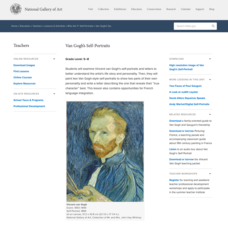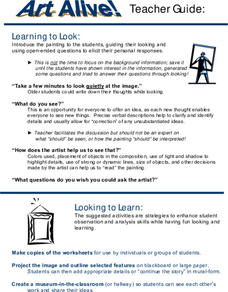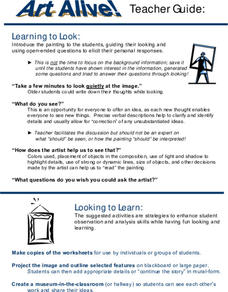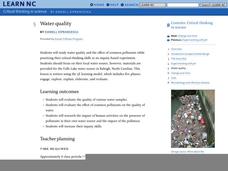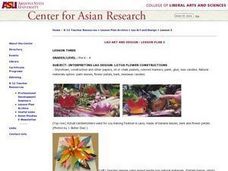National Gallery of Art
Van Gogh’s Self-Portraits
Scholars get to know famous Dutch painter, Vincent van Gogh, as an artist as well as a person. After reading personal letters and analyzing paintings, participants paint two self-portraits that represent their personality. Then, write a...
Curated OER
Toco Toucan - Oil Pastels
Students create a picture of a toucan from the continent of South America using a pencil, marker, and oil pastels. Students identify the continent of South America and discuss the Toco Toucan. They follow teacher directions to create...
Curated OER
Glue Fish
Get out the glue and those oil pastels its time for an art project. The class explores shape, art, and color as they draw fish with glue, let them dry, and then color them as they wish. This project would be wonderful after discussing...
Memorial Art Gallery
Learning to Look, Looking to Learn - Peeling Onions
Lilly Martin Spencer's "Peeling Onions" is the subject of a series of exercises that model for learners how to use the elements of art to read a painting. A series of worksheets focus viewers' attention on how Spencer uses...
Curated OER
Still-Life Painting: Arranging Nature
Students examine and paint still life paintings. In this still life painting lesson, students look at pictures of European still life paintings and determine the characteristics when using an opaque medium. They use an opaque medium to...
Curated OER
Let's Talk About Painting
Second graders identify the elements of the arts. In this visual arts activity, 2nd graders read the book Matthew's Dream and discuss the elements of the arts. Students create their own paintings according to the style of specific artists.
Curated OER
A Study of Warm And Cool Colors
Second graders create a multimedia painting using warm or cool colors expressively. They demonstrate multimedia techniques in a drawing using pencil, oil pastel and tempera paints. They recognize and discuss mood created by warm and cool...
Memorial Art Gallery
Art Alive! - Beach at Blue Point
And then what happened? Class members engage in a series of activities that model for them how to read the story in a painting. Participants respond to questions that ask them to closely examine the elements in William Glackens'...
Memorial Art Gallery
Art Alive! - Towing a Boat, Honfleur
Color, light and shadow, the placement and size of objects. These are some of the tools artists used to tell their stories. Model for learners how to read a painting by closely examining these features. The richly detailed packet...
Curated OER
Lascaux Cave Art on Ceramic Stones
Here is a great way to incorporate art into your next unit on prehistoric people. The class makes stones out of ceramic clay and then creates paintings like those found in the Lascaux Caves in France. A video link, full day-by-day...
Arts Ed Washington
Art Lessons in the Classroom: Our Family
Blend art and family into one lesson with an activity involving oil pastels and watercolors. After viewing a few famous portraits of families, learners create masterpieces that represent their own families.
Curated OER
Still-Life Painting: Arranging Nature Lesson 3
Students identify and analyze the characteristics of European still-life paintings. They paint still-life arrangements using various opaque medium techniques.
Curated OER
Subway Drawings
Pupils create oil pastel paintings where they cover the whole paper with oil pastels and outline and smear with black. In this oil pastels lesson plan, students first study the Subway Drawings done by Keith Haring.
Curated OER
The Lost Works of Vincent van Gogh
Students will be able to demonstrate knowledge about the life and works of Vincent van Gogh. They will also become aquainted with the use of oil paints and will be able to better identify with real artists by using their medium
Curated OER
What's Outside the Window
What do your students see when they look outside the window? This project lets their imagination go wild, and lets you see what kind of daydreaming they do best. They each draw, paint, and color an image of what they imagine as they are...
Curated OER
Periodic Pigment
Students make paint using the ingredients from recipes from the 17th century. In this paint making lesson plan, students follow a recipe with vegetable oil, eggs, pigment, paintbrushes, and more to make their paint.
Curated OER
The Figure of Paul Revere. Romanticizing Colonial American History
Students compare paintings to make conclusions about American History in the Revolutionary War time period. Students share opinions concerning visual art. Other artwork can be used to entice inquiry as needed.
Curated OER
Water Quality
Learners investigate the properties of oil and water by making marbleized paper. They examine fish species by making Japanese fish prints and 3-D cardboard fish. They create posters that present messages about conserving our waterways.
Curated OER
Lao Design: Mask making
Learners examine the concept of symmetry in Lao art and apply it to their own works. They construct full-face masks by copying the stencils onto colored paper. Students apply creative touches by painting and drawing on their assembled...
Curated OER
Lao Design: Lotus Flower Constructions
Students create lotus flowers in 3-D designs applying Lao art techniques. Following a teacher demonstration, they assemble their own lotus flower candleholders and the teacher arranges a group flotation in a body of water. Students...
Curated OER
Clowning Around: Drawing
Kids create a clown out of shapes. They work to show emotions while practicing their drawing skills. Pupils use circles, triangles, squares, oil pastels, and their imagination to draw, color, and decorate a sad or happy clown. Tip: Have...
Curated OER
Descriptive Writing: Using Art to Inspire description
Write with the senses! Try using art to inspire writers to consider all of the senses. Here, the class is divided in half. Each group looks at one of two images, imagines the senses that would be engaged, and records answers to five...
Curated OER
Watercolor Techniques
Students practice using watercolor paints in this lesson. They observe basic techniques used with watercolors and then try them. They use the internet to discover more techniques they could use.
